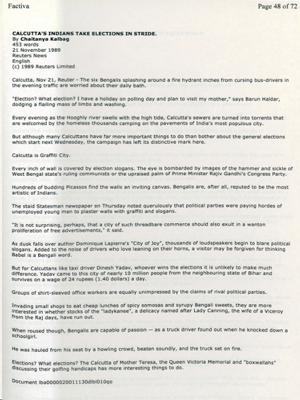CALCUTTA’S INDIANS TAKE ELECTIONS IN STRIDE
[Reuters]
Published date: 21st Nov 1989
21 November 1989
Reuters News
English
(c) 1989 Reuters Limited
Calcutta, Nov 21, Reuter – The six Bengalis splashing around a fire hydrant inches from cursing bus-drivers in the evening traffic are worried about their daily bath.
“Election? What election? I have a holiday on polling day and plan to visit my mother,” says Barun Haldar, dodging a flailing mass of limbs and washing.
Every evening as the Hooghly river swells with the high tide, Calcutta’s sewers are turned into torrents that are welcomed by the homeless thousands camping on the pavements of India’s most populous city.
But although many Calcuttans have far more important things to do than bother about the general elections which start next Wednesday, the campaign has left its distinctive mark here.
Calcutta is Graffiti City.
Every inch of wall is covered by election slogans. The eye is bombarded by images of the hammer and sickle of West Bengal state’s ruling communists or the upraised palm of Prime Minister Rajiv Gandhi’s Congress Party.
Hundreds of budding Picassos find the walls an inviting canvas. Bengalis are, after all, reputed to be the most artistic of Indians.
The staid Statesman newspaper on Thursday noted querulously that political parties were paying hordes of unemployed young men to plaster walls with graffiti and slogans.
“It is not surprising, perhaps, that a city of such threadbare commerce should also exult in a wanton proliferation of free advertisements,” it said.
As dusk falls over author Dominique Lapierre’s “City of Joy”, thousands of loudspeakers begin to blare political slogans. Added to the noise of drivers who love leaning on their horns, a visitor may be forgiven for thinking Babel is a Bengali word.
But for Calcuttans like taxi driver Dinesh Yadav, whoever wins the elections it is unlikely to make much difference. Yadav came to this city of nearly 10 million people from the neighbouring state of Bihar and survives on a wage of 24 rupees (1.40 dollars) a day.
Groups of shirt-sleeved office workers are equally unimpressed by the claims of rival political parties.
Invading small shops to eat cheap lunches of spicy somosas and syrupy Bengali sweets, they are more interested in whether stocks of the “ladykanee”, a delicacy named after Lady Canning, the wife of a Viceroy from the Raj days, have run out.
When roused though, Bengalis are capable of passion — as a truck driver found out when he knocked down a Schoolgirl.
He was hauled from his seat by a howling crowd, beaten soundly, and the truck set on fire.
Elections? What elections? The Calcutta of Mother Teresa, the Queen Victoria Memorial and “boxwallahs” discussing their golfing handicaps has more interesting things to do.






